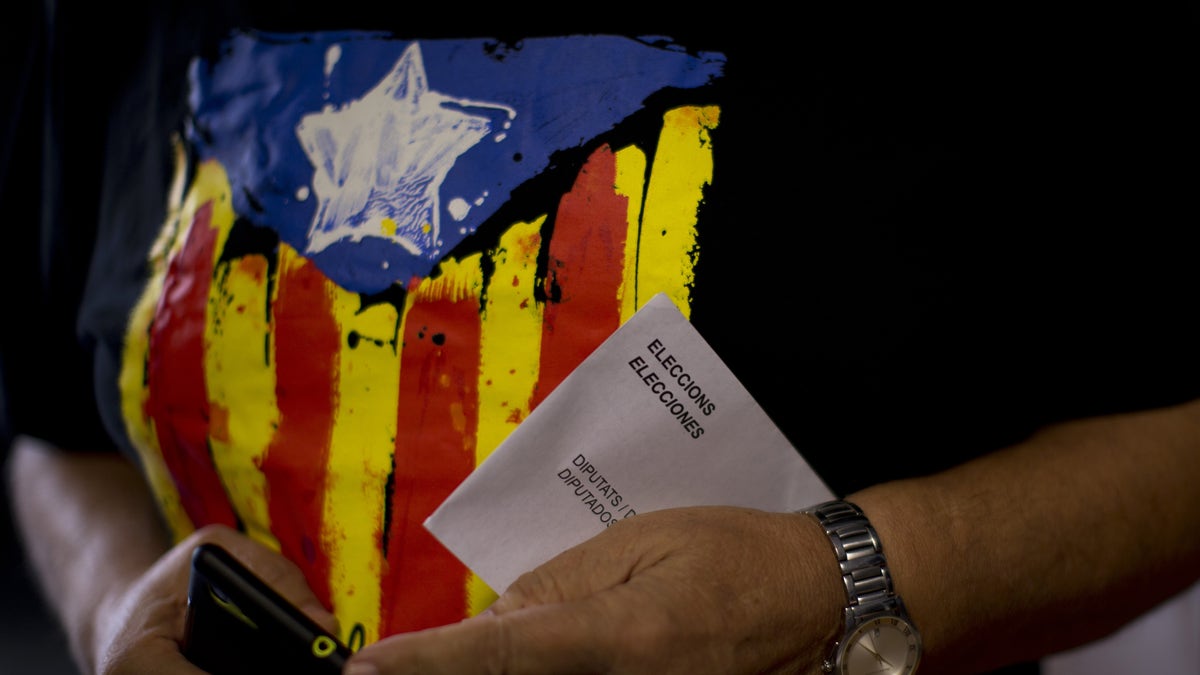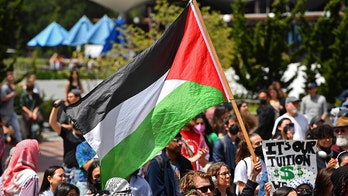
A man holds his ballot paper before voting at a polling station in Barcelona, Spain, Sunday Sept. 27, 2015. Voters in Catalonia go to the polls on Sunday to elect regional lawmakers, with pro-secession parties saying they will push for independence within 18 months if they win a majority in the 165-seat parliament, as most opinion polls predict they will. (AP Photo/Emilio Morenatti)
BARCELONA, Spain (AP) – Voters in Spain's Catalonia region cast ballots Sunday to decide if pro-secession parties will get a majority in the regional parliament and a mandate to push for independence or whether they will fall short in an outcome that would probably quell secessionist fervor for years.
Secessionists have long pushed for an independence referendum, but Spain's central government refused to allow it — saying such a vote would be unconstitutional. So the pro-independence parties pitched the vote for regional parliamentary seats as a de facto plebiscite.
"Today is a great win for democracy in Catalonia," said Artur Mas, Catalonia's regional leader, after he cast his vote. "We have surpassed all the obstacles placed by the Spanish government. Now, Catalonia faces its own destiny."
Sunday's election is for Catalonia's 135-member Parliament, located in the region's capital Barcelona. By early afternoon, around 35 percent of those eligible to vote had cast their ballots, more than 5 percent more than in the previous regional election, the government said. Regional spokeswoman Meritxell Borras said postal votes cast by Catalans living overseas could also have an important impact on the results.
Mas and the other secessionists argue that if they win 68 seats, the result would give them a democratic mandate to initiate an 18-month plan to split from Spain that could include a unilateral declaration of independence.
The central government of Prime Minister Mariano Rajoy says it will use all legal means to prevent Catalonia from breaking away, an exit European leaders warn would include ejection from the European Union.
Spain's government has also said it is concerned that if Catalonia tries to break free it would disrupt the fragile signs of economic recovery for the country that has endured unemployment of over 22 percent for several years.
While the majority of Catalans support a vote on independence to decide the divisive question, polls have forecast a slim win for the separatist parties. They also indicate that Mas' leading bloc of separatist parties "Together for Yes" will likely need the support of the extreme left-wing CUP to cobble together a majority of seats needed to launch their push to sever century-old ties with the rest of Spain.
Catalans from both sides of the independence divide are fiercely proud of their Catalan language, which is spoken along with Spanish and was suppressed under three decades of Gen. Francisco Franco's dictatorship. Many Catalans are also angry because they say their industrialized region, which represents nearly a fifth of Spain's economic output, pays too much in taxes and receives less than its fair share of government investment.
Jordi Perez was one of 5.3 million Catalans of the region's populace of 7.5 million called to vote on Sunday. The 50-year-old civil servant said he voted for "Together for Yes" because he feels Spain has historically disparaged Catalan culture and its language.
"I have wanted independence ever since I was young," Perez said after casting his ballot in Barcelona. "During three centuries they have robbed us of our culture. We have reached the moment that the Catalan people say enough is enough."
While the pro-independence camp has organized massive rallies of hundreds of thousands in recent years, those in favor of remaining a part of Spain have kept a low profile.
School teacher Sandra Guerrero, 30, said that these elections motivated her to vote for the first time. She voted for the Citizens party, which is against independence.
"We Catalans have the fame of all being separatists, but the truth is that I have voted No," Guerrero said. "My parents are from Andalucia (in southern Spain). People from outside Catalonia have always treated me well. I feel part of Spain. I am proud to be Catalan, but also to be Spanish.
"I had never voted before because I was disillusioned with politics. But this time I have because these are important elections."




